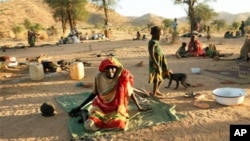The U.N. refugee agency reports torrential rains in Chad are affecting about 150,000 people. The UNHCR says more than one-third of the flood-affected victims are refugees, mainly from the Central African Republic.
Heavy rains have been pummeling Chad, a normally dry country, for the past two months. These are the worst rainfalls recorded in Chad for 40 years and the country is reeling from the magnitude of the disaster.
U.N. refugee spokeswoman, Fatoumata LeJeune-Kaba tells VOA nearly half of the 150,000 flood victims have had their houses destroyed and are now homeless.
She says 57,000 refugees from the Central African Republic, who are sheltering in south and southeast Chad, are hard hit and in great need of assistance.
"The rains are particularly disruptive because not only the flooding has swept away fields, crops, but also shelters," LeJeune-Kaba said. "And, as a result it is very difficult…to get access to the people most in need around the country."
LeJeune-Kaba says many bridges and roads leading to refugee camps have been swept away. She says many of the shelters and latrines also have collapsed. She says it is likely the school year, which should start October 1, will be delayed until new shelter can be found for homeless people currently living in the schools.
She says aid workers are worried about the health hazards facing the victims.
"People have lost their crops and with the rainy season actually and the epidemic of cholera, that could easily spread through the rainy season," LeJeune-Kaba said. "We're very worried. There are so many people that are already distressed. With the rains, with the water stagnating in areas and people not being able to drink from clean water."
On September 3, the government declared a cholera epidemic in Chad. The disease already has claimed 41 lives and aid agencies are worried cholera could spread further given the bad conditions resulting from the flood.
LeJeune Kaba says malaria from stagnating pools of water also is a big worry. To counter that and other health risks, she says her agency is instructing people to maintain basic hygiene and prevent children from playing in stagnant water.
She says the UNHCR is including mosquito nets to protect people from malaria in the basic relief kits it is distributing to the refugees and local people in the area.




